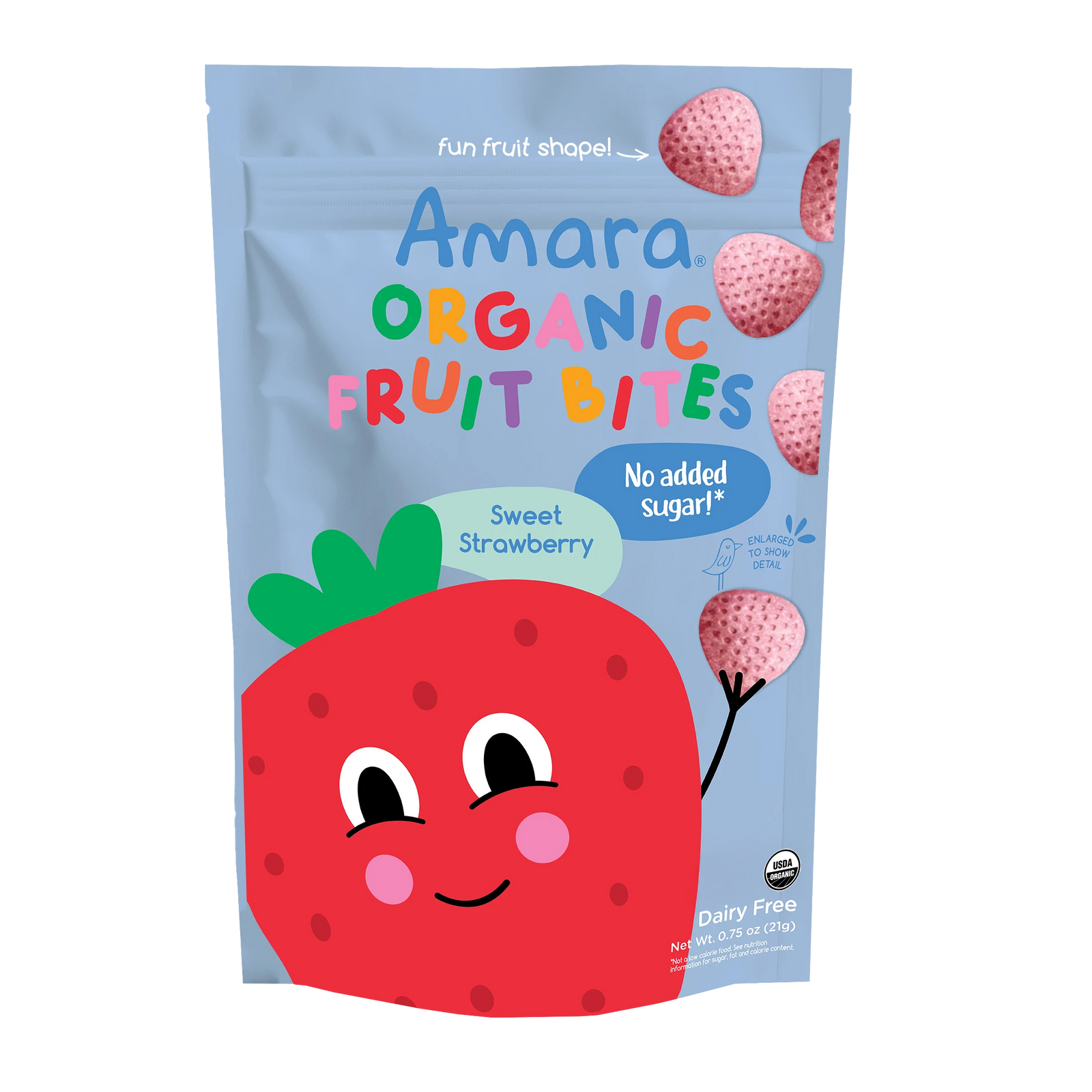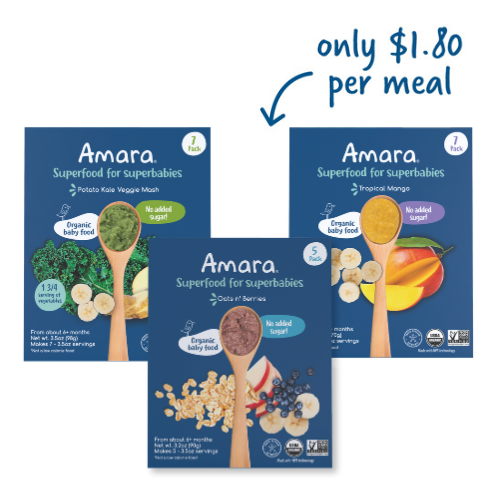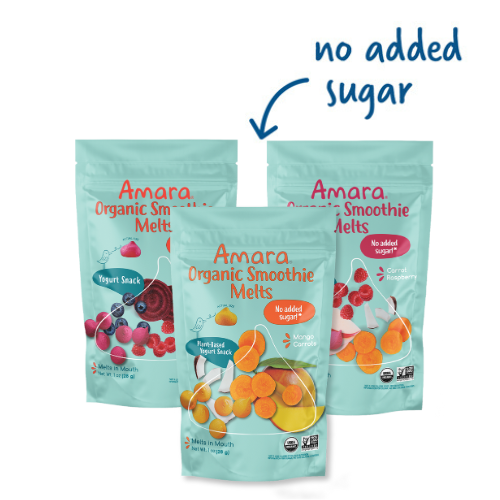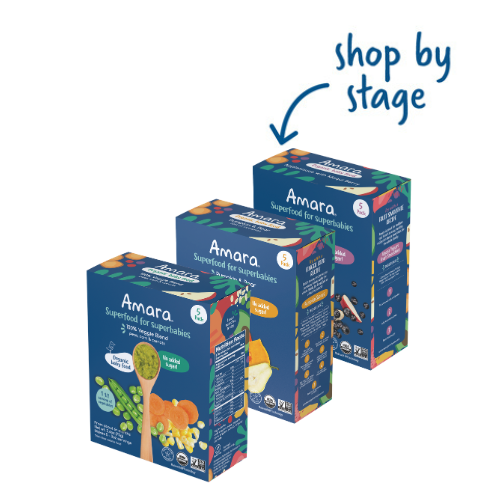
The topic of infant nutrition and its impact on brain development is a complex and ever-changing topic of research and discovery. Here we aim not to provide an exhaustive presentation on the subject, but instead bring to light some interesting findings that might provide useful and instructive to new parents and caregivers.
Current State of the Dietary Union
Despite parents' cries of “eat your vegetables,” and government and public health organizations' pleas to incorporate more fresh fruits and vegetables into the American diet, families are actually consuming fewer of these brain-supporting foods than before.
While the American Academy of Pediatrics recommends vegetable or fruit consumption with every meal and snack, a recent survey in Pediatrics found that one in four 6- to 11-month-olds and one in five 1-year-olds had no reported vegetable consumption at all on days they were surveyed.
According to the Economic Research Service (ERS), Americans’ consumption of fruits and vegetables fell from 299 pounds per person in 2003 to 272 pounds in 2013.
Another study which tracked and analyzed the eating patterns of infants in America is the Feeding Infants and Toddlers Study (FITS). One trend they identified in the infant diet is higher levels of recommended energy, protein, and saturated fats. They found that the majority of babies are bottle fed at some point throughout their first year. They also identified that weaning foods were more likely to be high in starch instead of green vegetables and fruits. Finally, the study found that on an average day, a preschooler was more likely to have had a sweet or sugary drink rather than a serving of fresh fruit or vegetables. This pattern is reminiscent of the adult American diet.
Diet, Cognitive Development, and Environment
While brain growth happens in surges throughout childhood with different parts of the brain developing more strongly at different times, it is true that a child’s brain grows to 80% of its adult size by age 2. During this period of rapid brain growth, studies show nutritional quality is one of the influences on cognitive development in infancy and adolescence. Nutrition has been found to be a leading environmental factor which can impact gene expression in humans, meaning a child’s diet plays a role in which parts of their genetic code are expressed or not. An ever-growing body of research suggests that improved nutrition leads to optimal brain function and better overall health outcomes.
This period of development may be especially sensitive to certain nutritional deficiencies in a child’s diet. Historically, the scientific community has isolated micro and macro nutrients in a child’s diet to measure these sensitivities. Many studies have focused on these micronutrients found to be essential to proper cognitive development: Iron, Zinc, Iodine, Choline, B Vitamins. While these nutrients are proven to be vital in the role of brain development, the extent to which nutritional deficiencies have a lasting impact on the child into adulthood remains unclear. Generally, the nutritional deficiency’s toll will be further influenced by these four factors: environment, timing of deficiency, degree of deficiency, and possibility of recovery.
Research is now exploring the overall diet as it works in synergy and not only by isolating certain micro and macronutrients. If overall poor diet can lead to multiple deficiencies in key micro and macro nutrients, and inversely, a quality diet leads to proper nutrition, public health interventions should focus more on an overall approach to healthy eating. Further supplementing key nutrients to avoid deficiency may not be helpful for cognitive functioning if a child is not receiving adequate stimulation from his environment. Receiving key nutrients alone is not enough to lead to optimal brain function. Inversely, providing a rich environment in the absence of proper nutrition will not be adequate. Therefore both nourishment and a stimulating environment are required for the best cognitive outcomes.

Early Diet and Future Brain Function
Several studies have pointed out that certain unhealthy eating habits have led to less than optimal cognitive functioning in future years.
One such study noted, “A dietary pattern high in fruits, vegetables, and home-prepared foods at the age of 6 and 12 months has been associated with better cognitive function at the age of four.” On the other hand, “Dietary patterns, including a high consumption of sausage, fast food, snacks, and sugar sweetened beverages at the age of three years, has been related to poorer academic achievement at the age of 10 years among children.”
Another study with similar findings “considered dietary patterns in infancy in relation to cognitive development and found higher full-scale IQ (measured on the Wechsler Preschool and Primary Scale of Intelligence test) at 4 years of age in children who consumed higher amounts of fruit, vegetables and food prepared at home during infancy (i.e.,between 6 and 12 months). The association remained significant after adjusting for a wide range of factors, including socioeconomic status, maternal IQ and education.
The Brain Gut Connection
While the brain and gut connection is fairly new territory, mounting evidence suggests that there is a strong relationship between the two. Therefore, a healthy microbiome may be one of the key factors in healthy cognitive functioning in adults as well as children. “Therefore, an enhanced understanding of how the microbiome-gut-brain axis operates during infancy may provide novel insights into early-life neurocognitive and social-emotional development. In addition, a better understanding and appreciation of several potentially modifiable factors that influence the newborn and infant microbiome is essential, particularly for midwives and neonatal nurses who care for women and their infants during the crucial first 1,000 days of life.
Takeaways & What You Can Do
In summary, infancy to toddlerhood is a critical time in a child’s brain development and proper nutrition along with a stimulating environment are both vital in optimal brain development. Not only avoiding micronutrient deficiencies, but also a focus on developing an overall healthy attitude towards food and good dietary choices helps build better future cognitive outcomes.
By the end of a toddler’s second year, neophobia, or the refusal to try new foods, may take hold. That’s why it is especially important to repeatedly introduce a wide variety of grains, vegetables, and fruits from weaning through toddlerhood. In terms of brain-boosting foods, fruits, especially berries, and vegetables are rich in flavonoids, and a higher intake of flavonoids has been associated with better cognition. Keep in mind it may take up to 10 times for a child to accept a new food and continuing to provide opportunities to taste and experience a wide range of textures, smells, and tastes is key to avoiding picky eating and refusal of fruits and vegetables down the road.
So let’s start introducing real food to our babies today. It may seem overwhelming to have to cook all of your baby’s purees and foods from scratch, but it needn’t be. At Amara, we have developed homemade baby food without the need for refrigeration-- or the hassle. Our unique technology takes organic whole foods and dries them without needing to use repeated high heat which leeches out their nutrients and homogenizes their tastes, textures and smells. What remains is the original taste, smell and texture of fresh foods, blended according to our expert nutritionist and recipe developer to ensure that the foods are both age-appropriate and also packed with plant-based proteins and fruits and vegetables to jumpstart a baby’s healthy eating habits. Yes, you can have your puree and eat it too. ;)

Looking for Amara organic baby food blends? Shop our best-selling variety packs Introduction to Textures and Introduction to Solids.
 Amara's Chief Nutritionist: Sonia A. Schiess, PhD in Nutrition, specialized in the introduction of solids and liquids to infants.
Amara's Chief Nutritionist: Sonia A. Schiess, PhD in Nutrition, specialized in the introduction of solids and liquids to infants.
Resources:
Lessons from the Feeding Infants and Toddlers Study in North America: What Children Eat, and Implications for Obesity Prevention
JM Saavedra, 2013
An Overview on the Associations between Health Behaviors and Brain Health in Children and Adolescents with Special Reference to Diet Quality
S Naveed et al, 2020
The role of nutrition in children's neurocognitive development, from pregnancy through childhood.
Nyaradi A et al, 2013
Nutrition and brain development on early life,
- Prado & KG Dewey, 2014
The Infant Microbiome: Implications for Infant Health and Neurocognitive Development
I Yang et al, 2016
Many U.S. children go days without eating any vegetables, survey finds
Dennis Thompson
May 1, 2017 / 10:42 AM / HealthDay
Complementary Feeding Strategies to Facilitate Acceptance of Fruits and Vegetables: A Narrative Review of the Literature
S Nicklaus
https://www.cdc.gov/nutrition/downloads/fruits-vegetables/2018/2018-fruit-vegetable-report-508.pdf








Leave A Comment